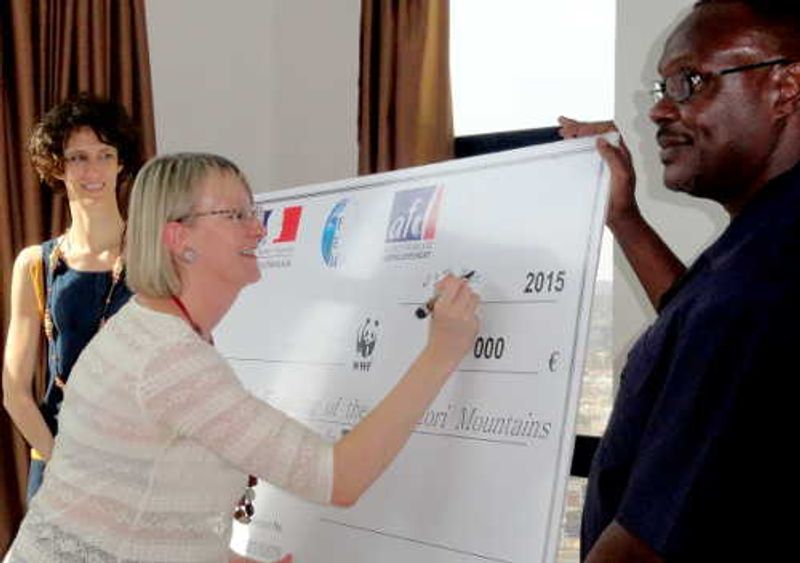

French Ambassador Sophie Makame signing the dummy cheque for WWF
The Rwenzori mountain ranges and their beautiful flora and fauna have been described as a one of Uganda’s potential gold mines which is increasingly being threatened by climate change as well as underinvestment by the government.
Thanks however to new funding from the European union and the French government, 000) to Uganda.
The project, to be implemented by World Wide Fund for nature (WWF) seeks to ensure that the park is able to generate more money through tourism by developing plans to attract more tourists to the mountains, but also through other potential revenue streams such as selling carbon credits out its vast forest cover, and getting private companies that use the mountain’s water to pay for it.
While at the launch of the project at Alliance Francaise in Kamwokya, Kampala, the Head of the EU delegation in Uganda Ambassador Kristian Schmidt, labelled the Rwenzori’s as ‘a potential gold mine that does not need extractive infrastructure.
Schmidt however stressed that the ‘mountains of the moon’ as they were baptised by geographer Ptolemy, can only become a gold mine if, as he said; “Us humans can preserve it and put an end to its fast degradation.”
At the launch of the project, a number of threats facing the mountain’s flora and fauna, were highlighted. Most prominent among them is the highly publicised but real disappearing ice cover that has been attributed to global warming.
But the recent landslides and massive floods that have ravaged the region, especially Kasese, have brought into full glare the harsh realities of other destructive activities such as deforestation, that have taken place over the years on the mountains and exposed top soil to erosion.
While Ambassador Schmidt praised the dynamic, creative and supportive spirit of the people living on the Rwenzori mountains, he highlighted the lack of commitment on the part of the Ugandan government in terms of investing in facilities and policies geared towards ensuring that biodiversity is conserved.
He said: “I call upon our partners, the government of Uganda to demonstrate real commitment to the sector [wildlife conservation]. The financial allocations, legal and policy frameworks for the sector and a real capacity to enforce them are still lacking, yet these – as you know, are crucial for triggering growth and investment.”
The latest effort to bolster Uganda’s tourism comes alongside other donor-supported programmes, such as the recently signed pact between Uganda, Rwanda and DR Congo to increase security around the Virunga National Park.
Ambassador Schmidt reminded the government that Uganda’s tourism sector, which was the country’s top foreign exchange earner ahead of remittances, with Ushs 5.5 trillion last financial year 2013/2014, is dependent on conservation, stewardship and protection.
While delegates nodded to the government’s efforts to pacify the Rwenzori’s, a number of experts and close observers of the sector argue that the government has not only under-invested into the sector, it allows destructive activities such as trafficking in ivory trade, to continue.
For example, while the Rwenzori ranges beat Mt. Kilimanjaro of Tanzania in terms of the biodiversity but also landscape variation, Kilimanjaro attracts more than ten times the number of tourists (30,000 to 40,000) every year, compared to 2000 that visit Rwenzori.
The availability of a nearby airport for Kilimanjaro which facilitates easier transportation of tourists, was cited as an advantage for Tanzania over Uganda when considering the marketability of the two regions.
But besides the infrastructural disadvantages for Rwenzori, Schmidt pointed out, Uganda is on the international radar as a transit route as well as a source of wildlife trafficking, something that not only depletes the country’s attractive animals but also damages the country’s international reputation.
While donor support remains relevant especially for poor countries like Uganda, past experiences from sectors such as education, health where donors have played a leading role, suggest there should be less optimism for change that seeks to take advantage of the helping hand.
The results of such fruits tend to be short-lived, usually within a few years of the project implementation period, while recommendations for further action remain in reports that never see the light of day.














Gabriel Buule
Leave a Comment
Your email address will not be published.